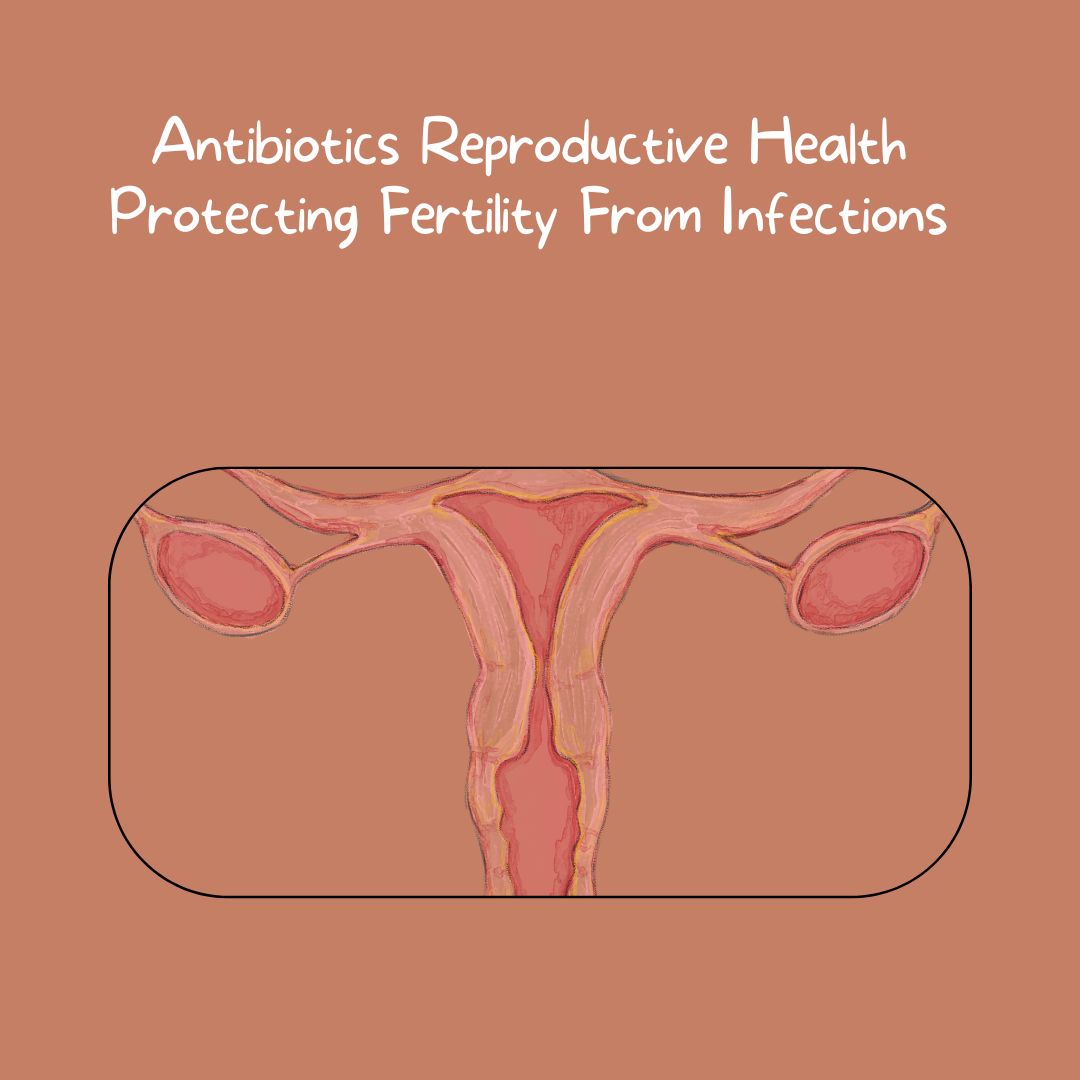Antibiotics Reproductive Health Protecting Fertility From Infections

As a reproductive health specialist, I am passionate about helping people find ways to protect their fertility and understand the importance of reproductive health. This article focuses on the relationship between antibiotics and reproductive health and how they can play a role in protecting fertility and preventing infections. Antibiotics are powerful medications used to treat bacterial infections, but they can also have an effect on fertility and reproductive health. It is important to understand the effects of antibiotics on reproductive health and how to protect fertility when taking them. In this article, I will explain the potential implications of antibiotic use on reproductive health and how to minimize the risk of infection and protect fertility.
Antibiotics & Fertility
Antibiotics are an important part of reproductive health and protecting fertility from infections. According to the Centers for Disease Control and Prevention (CDC), 1 in 3 women of reproductive age in the United States have a sexually transmitted infection (STI). Many STIs can be treated effectively with antibiotics, which can help prevent infertility. In fact, the World Health Organization (WHO) estimates that one in four infertility cases worldwide is a result of untreated STIs.
Taking the right antibiotics in the correct dosage is essential for successful treatment. All antibiotics have side effects, and the wrong dosage could cause other health complications and even infertility. Also, taking antibiotics for too long can cause bacteria to become resistant, making it difficult to treat infections in the future.
Women who are planning to get pregnant should get tested for STIs and take the necessary steps to protect their fertility. This includes using condoms and getting tested regularly for STIs, as well as informing their doctor if they have ever experienced an STI. Women should also keep track of their health and take all antibiotics as prescribed by their doctor.
In conclusion, antibiotics are an important part of reproductive health and protecting fertility from infections. It is essential to take antibiotics as prescribed and to get tested regularly for STIs to protect fertility and reproductive health.
Antibiotics & Infections
Antibiotics are a powerful form of medication used to fight bacterial infections. Unfortunately, when antibiotics are taken without proper guidance, it can lead to fertility issues. This is especially true when antibiotics are used to fight infections in the reproductive system.
When antibiotics are used to treat reproductive system infections, they can cause inflammation and scarring. This can damage the reproductive system and affect a person’s ability to have a successful pregnancy. Some antibiotics can even affect the production of hormones that are necessary for conception.
To protect reproductive health, antibiotics should be taken as prescribed by a doctor. It is important to use the full course of antibiotics to make sure that the infection is completely cleared. Women who are pregnant or are trying to conceive should consult with their physician about the risks of antibiotics before taking them.
In addition to taking antibiotics as prescribed, people can avoid the risk of fertility issues by reducing their risk of infection. This includes washing hands regularly, avoiding contact with people who have an infection, and avoiding sharing personal items. Vaccinations can also help reduce the risk of infection and should be discussed with a doctor.
It is important to talk to a doctor about the risks associated with antibiotics and other medications used to treat infections. By doing so, people can help protect their reproductive health and reduce their risk of fertility issues.
Bacterial Resistance & Fertility
Antibiotics are essential medicines that can protect us from bacterial infections, but they can also have a negative impact on reproductive health. Bacterial resistance is a growing concern as it means that antibiotics are losing their efficacy. As a result, it is important to protect fertility from infections caused by bacteria to ensure that reproductive health is not put at risk.
Recent research has shown that the use of antibiotics can reduce the fertility of both women and men. Women who take antibiotics are more likely to experience irregular periods and ovulation pain, while men can suffer from reduced sperm counts. However, these effects may go away once the course of antibiotics is completed.
In addition to this, it is important to consider the impact of bacterial infections on fertility. Certain infections, such as sexually transmitted infections, can cause infertility, and this is why it is important to practice safe sex and to seek medical assistance at the earliest sign of infection. Even in cases where infections do not cause infertility, they can still have a negative impact on reproductive health.
To reduce the risk of infertility, it is essential to follow medical advice and take antibiotics only when prescribed by a doctor. Taking antibiotics without a prescription can also contribute to the growing problem of bacterial resistance. Lastly, couples considering fertility treatments should speak to their doctors about any current infections or antibiotic therapies being used.
Overall, antibiotics can be incredibly useful in treating bacterial infections, but it is important to consider their potential impact on reproductive health. To protect fertility, it is best to practice safe sex and seek medical advice if
Types of Infections & Fertility
Antibiotics have been used to treat infections for centuries, but their use has become increasingly important in recent years due to the rise of antibiotic-resistant strains of bacteria. Reproductive health and fertility are two areas that need to be protected from infections, and antibiotics can be a valuable tool in doing so.
Infections can be caused by a variety of agents, including bacteria, fungi, viruses, and parasites. Bacterial infections are generally the most common, and can be treated with a variety of antibiotics. Fungal infections can often be treated with antifungal drugs, while viral infections may require antiviral medications.
Antibiotics are most commonly used to treat bacterial infections, which can cause a variety of reproductive health issues, including pelvic inflammatory disease, ectopic pregnancies, and infertility in both men and women. Studies have shown that in some cases, antibiotics can even reduce the risk of fertility-related complications.

When antibiotics are used to treat reproductive health issues, it is important to use the right type of antibiotic for the infection and to take the full course of the medication to ensure that the infection is fully treated. It is also important to note that some antibiotics can interfere with contraception, so it is important to use a backup form of contraception if you are taking antibiotics.
To protect your fertility and reproductive health, it is important to take preventative measures such as practicing safe sex and limiting your exposure to infections. When necessary, antibiotics can be a powerful tool to treat infections and help ensure your reproductive health. To
Diagnosing Infections
Infections, both bacterial and viral, can have a serious effect on reproductive health and fertility. In order to protect fertility, it is essential to know how to diagnose potential infections. While some infections may go unnoticed, others can have severe implications for fertility.
For example, bacterial infections can lead to pelvic inflammatory disease (PID). This is one of the most common causes of infertility and can significantly diminish a person’s chances of conceiving. The most effective approach is to identify and treat infections early with antibiotics.
Women who are sexually active and experience symptoms of an infection should seek medical attention. Common symptoms of PID may include pelvic pain, fever, painful intercourse, and abnormal vaginal discharge. Blood tests and pelvic examinations are essential in diagnosing an infection.
It is important to note that antibiotics can have side effects. People prescribed antibiotics should always take the full course of medication, as prescribed by their doctor, to avoid the risk of antibiotic resistance. If side effects occur, they should be discussed with a doctor.
In addition to seeking medical attention, there are many lifestyle strategies to protect reproductive health, such as avoiding smoking, drinking and drug use. Practicing safe sex and preventing STDs can significantly reduce the risk of both bacterial and viral infections.
Treatment Options
Antibiotics can have a significant impact on reproductive health and fertility. This is especially true for women, as infections can cause infertility or an increased risk of miscarriage. However, by understanding the potential risks and taking appropriate steps to reduce them, women can protect their fertility.
Antibiotics work by killing bacteria, and while this can be helpful to combat infections, it can also affect the body’s natural microbiome, which is important for reproductive health. Studies have shown that antibiotic use can lead to an increased risk of miscarriage, premature delivery and other reproductive issues.
Fortunately, there are options available to reduce the risk of reproductive complications caused by antibiotics. These include taking probiotics to restore the natural balance of bacteria in the body and using alternative treatments such as herbal and natural remedies where possible. Additionally, it is important to discuss any potential risks with your doctor before beginning any course of antibiotics.
When used appropriately, antibiotics can be an effective way of treating infections, but it is important to be aware of the potential risks to reproductive health. According to the Centers for Disease Control and Prevention, up to one-third of antibiotic prescriptions are unnecessary, so it is important to ensure that antibiotics are only being used when absolutely necessary.
By being aware of the risks associated with antibiotics and taking steps to reduce them, women can do their best to protect their fertility and reproductive health. With the right precautions and treatments, antibiotics can be used safely while still protecting fertility.
Prevention Strategies
Antibiotics are one of the most widely used medications in the world. Unfortunately, a growing concern among the medical community is the potential for antibiotics to negatively impact reproductive health. While antibiotics are essential for treating infections, the potential for fertility complications should not be overlooked.
Research has shown that antibiotics can disrupt the delicate balance of hormones that are necessary for reproduction. This can lead to a decrease in fertility, and even cause miscarriages. To protect reproductive health, antibiotics should only be taken when absolutely necessary.
In addition to using antibiotics sparingly, it is important to practice good hygiene and avoid contact with people who are ill. Washing hands regularly and avoiding contact with those who are sick can help reduce the spread of infections and prevent the need for antibiotics.
Healthcare providers should also counsel patients on the potential reproductive risks of antibiotics. According to the Centers for Disease Control and Prevention, women should talk to their healthcare provider about the risks of taking antibiotics before deciding to take them.
In conclusion, antibiotics can have an impact on reproductive health and fertility. However, by taking a few simple steps such as using antibiotics only when necessary, practicing good hygiene, and discussing the risks with healthcare providers, people can reduce their risk of fertility complications.
Conclusion
antibiotics are essential to the health of both men and women. It is important to take antibiotics as prescribed to protect against infection and its potential damage to reproductive health. It is also important to be aware of the potential side-effects of antibiotics, and to talk to your doctor if you have any concerns. For those who are already pregnant, taking antibiotics can be beneficial in helping to protect the developing fetus. Finally, maintaining good overall health is the best way to protect against infections and ensure the health of both mother and baby. Taking proactive steps to protect reproductive health can help ensure a safe and healthy pregnancy. Let’s all commit to being informed and proactive in protecting our reproductive health.
One Comment